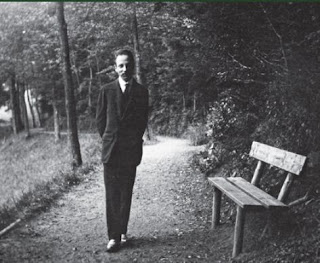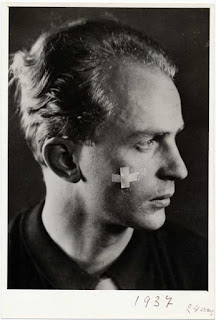(4 December 1875 – 29 December 1926)
O trees of life, oh, what when winter comes?
We are not of one mind. Are not like birds
in unison migrating. And overtaken,
overdue, we thrust ourselves into the wind
and fall to earth into indifferent ponds.
Blossoming and withering we comprehend as one.
And somewhere lions roam, quite unaware,
in their magnificence, of any weaknesss.
But we, while wholly concentrating on one thing,
already feel the pressure of another.
Hatred is our first response. And lovers,
are they not forever invading one another's
boundaries? -although they promised space,
hunting and homeland. Then, for a sketch
drawn at a moment's impulse, a ground of contrast
is prepared, painfully, so that we may see.
For they are most exact with us. We do not know
the contours of our feelings. We only know
what shapes them from the outside.
Who has not sat, afraid, before his own heart's
curtain? It lifted and displayed the scenery
of departure. Easy to understand. The well-known
garden swaying just a little. Then came the dancer.
Not he! Enough! However lightly he pretends to move:
he is just disguised, costumed, an ordinary man
who enters through the kitchen when coming home.
I will not have these half-filled human masks;
better the puppet. It at least is full.
I will endure this well-stuffed doll, the wire,
the face that is nothing but appearance. Here out front
I wait. Even if the lights go down and I am told:
"There's nothing more to come," -even if
the grayish drafts of emptiness come drifting down
from the deserted stage -even if not one
of my now silent forebears sist beside me
any longer, not a woman, not even a boy-
he with the brown and squinting eyes-:
I'll still remain. For one can always watch.
Am I not right? You, to whom life would taste
so bitter, Father, after you - for my sake -
slipped of mine, that first muddy infusion
of my necessity. You kept on tasting, Father,
as I kept on growing, troubled by the aftertaste
of my so strange a future as you kept searching
my unfocused gaze -you who, so often since
you died, have been afraid for my well-being,
within my deepest hope, relinquishing that calmness,
the realms of equanimity such as the dead possess
for my so small fate -Am I not right?
And you, my parents, am I not right? You who loved me
for that small beginning of my love for you
from which I always shyly turned away, because
the distance in your features grew, changed,
even while I loved it, into cosmic space
where you no longer were...: and when I feel
inclined to wait before the puppet stage, no,
rather to stare at is so intensely that in the end
to counter-balance my searching gaze, an angel
has to come as an actor, and begin manipulating
the lifeless bodies of the puppets to perform.
Angel and puppet! Now at last there is a play!
Then what we seperate can come together by our
very presence. And only then the entire cycle
of our own life-seasons is revealed and set in motion.
Above, beyond us, the angel plays. Look:
must not the dying notice how unreal, how full
of pretense is all that we accomplish here, where
nothing is to be itself. O hours of childhood,
when behind each shape more that the past lay hidden,
when that which lay before us was not the future.
We grew, of course, and sometimes were impatient
in growing up, half for the sake of pleasing those
with nothing left but their own grown-upness.
Yet, when alone, we entertained ourselves
with what alone endures, we would stand there
in the infinite space that spans the world and toys,
upon a place, which from the first beginnniing
had been prepared to serve a pure event.
Who shows a child just as it stands? Who places him
within his constellation, with the measuring-rod
of distance in his hand. Who makes his death
from gray bread that grows hard, -or leaves
it there inside his rounded mouth, jagged as the core
of a sweet apple?.......The minds of murderers
are easily comprehended. But this: to contain death,
the whole of death, even before life has begun,
to hold it all so gently within oneself,
and not be angry: that is indescribable.
Translated by Albert Ernest Flemming

Rilke három évesen
Duinói Elégiák - A NEGYEDIK ELÉGIA
Duineser Elegien - Die Vierte Elegie
Ó, élet fái, mikor ér a tél?
Nem értünk egyet. Ösztön, mint a vándor-
madarat, nem visz. Késve-maradozva
kapunk föl egy-egy szélre hirtelen
s hullunk megint le részvétlen tavakra.
Nyílást, hervadást egyformán tudunk.
Bár oroszlánok járnak valahol még,
s míg pompáznak, nem ismernek hanyatlást.
S mi, egyet vélve váltig, már a másik
gerjedését érezzük. A közellét:
ellenségünk. Nem párkányon bolyongnak
egymásban is a szeretők, noha
egymásnak hont, hajszát, távolt igértek?
Az ellentét alapja készül itt
a perc rajzához, fáradságosan,
hogy lássuk; mert nagyon világosak
velünk. Nem ismerjük az érzés
kontúrját, csak mi kintről alakítja.
Ki nem ült szíve függönye előtt
szorongva? Szétnyílt: búcsújelenet volt,
könnyen megérthető. Az ismerős kert,
s halkan megbillent -: csak most jött a táncos.
Nem az. Elég. S bármilyen könnyed is,
álruhában van, polgár lesz belőle
és konyháján át megy be a lakásba.
Nem kellenek e féligteli maszkok,
inkább a bábu. Az telt. El fogom
tűrni az irhát és a drótot és
bamba arcát. Itt. Előtte vagyok.
Ha kihunynak is a lámpák, ha azt
mondják is: Vége - s szürke léghuzattal
meg is csap a színpadról az üresség,
s ha nem is ül már néma őseim
közül velem itt senki, nő se, sőt a
kancsal barnaszemű fiú se: mégis
maradok. Mindig van látnivaló.
Nincs igazam? Kinek oly keserű volt
a lét, létemet ízlelve, apám,
ki kényszerem első zavart levét,
ahogy nőttem, ízlelted újton-újra,
s jövőm idegen zamatán tünődve
vizsgáltad, ha ernyedten föltekintek -
apám, ki bennem, mióta halott vagy,
reményem mélyén gyakran ott szorongsz
s közönyt, a holtak közönyét, közöny-
országokat adsz föl kis sorsomért:
nincs igazam? S nincs igazam, ti, kik
szerettetek, felétek sarjadó
szeretetemért, melytől untalan
eltértem, mert a tér orcátokon,
mivel szerettem, világtérbe tágult,
s abban nem voltatok már... Ámha kedvem
van a bábszínpad előtt várni! nem:
oly merőn nézni, hogy fölérni végül
nézésemmel, játékosul csak angyal
rángathatja a bábukat magasba.
Angyal és bábu: az lesz csak a játék.
Így olvad össze, amit szűntelen
megosztunk, amíg itt vagyunk. Csak így
alakul ki az egész pálya íve
évszakainkból. Ilyenkor fölöttünk
az angyal játszik. Ők ne sejtenék, lásd,
a haldoklók, hogy mennyire csupán
ürügy itt minden művünk? Semmi nem
egy önmagával. Ó, gyerekkori
órák, mikor az ablakok mögött
több volt múltnál, s nem volt jövő előttünk!
Nőttünk, igaz, s mohón is, hogy hamar
nagyok legyünk, félig értük: akiknek
egyebük sem volt már, mint hogy nagyok.
S mégis boldoggá tett a Maradandó,
utunk egyedülségében - s csak álltunk
a senkiföldjén, játék és világ közt,
a térben, mely a kezdet kezdetétől
egy tiszta tény számára született.
Ki mutat gyermeket, úgy, amilyen? ki
emeli égre? ki adja kezébe
a messzeség mércéjét? szikkadó
szürke kenyérből ki készíti - vagy, szép
alma csutkáját, szájában ki hagyja
a gyermekhalált?... Gyilkosba belátni
könnyű. De ez: a halált, az egészet,
s még az élet előtt, ilyen szelíden
tartalmazni, s gonosznak mégse lenni:
leírhatatlan.
Rónay György fordítása

______
Rainer Maria Rilke versei, Európa Könyvkiadó, Budapest, 1983



























